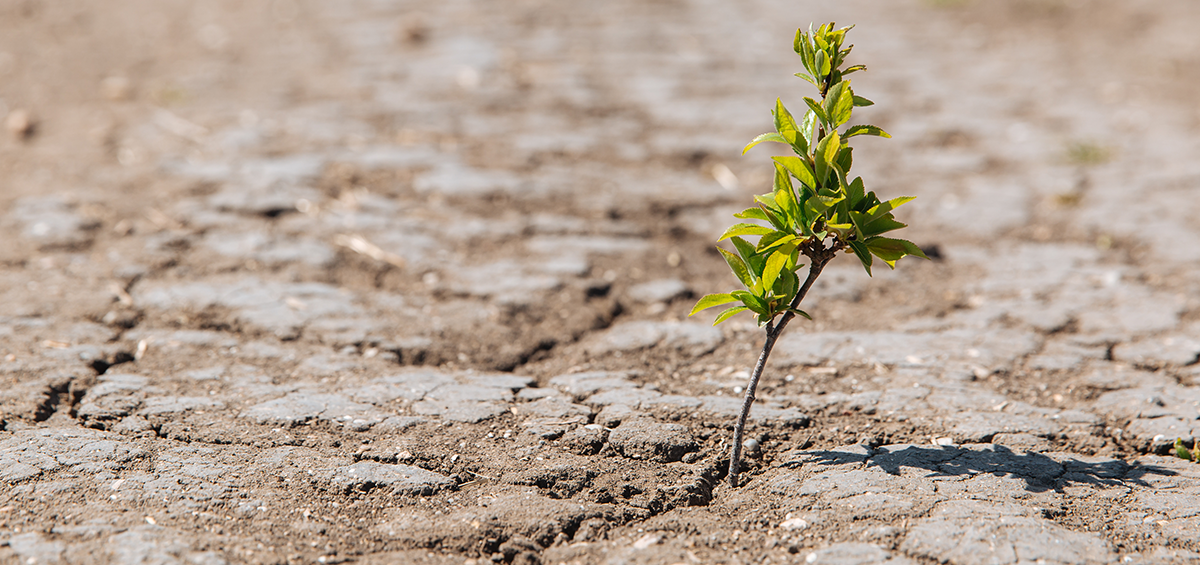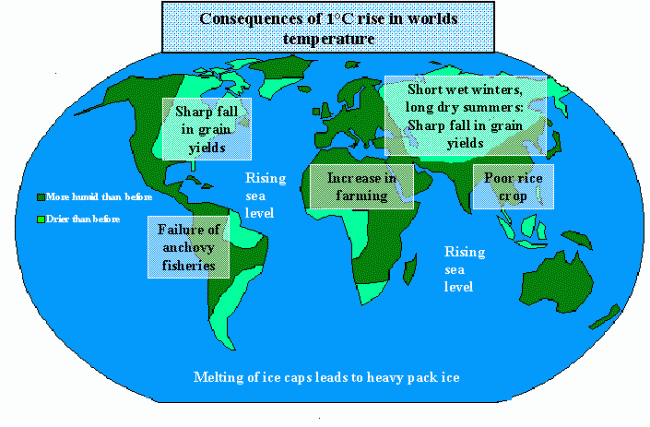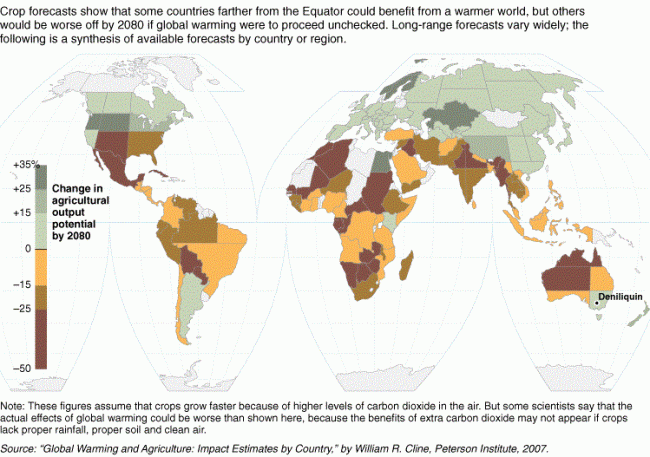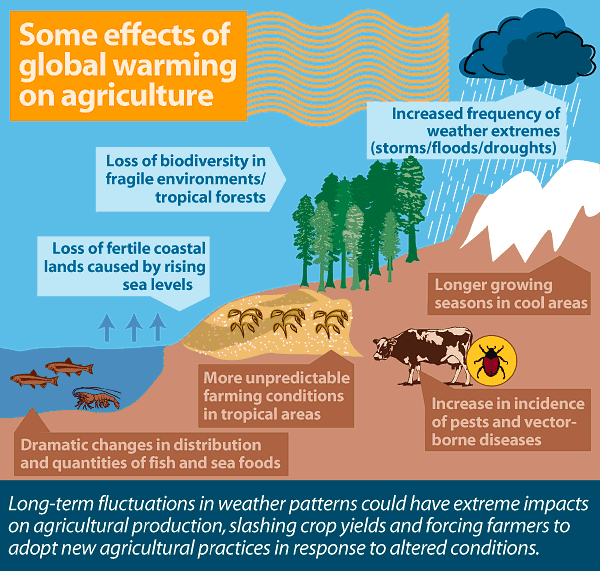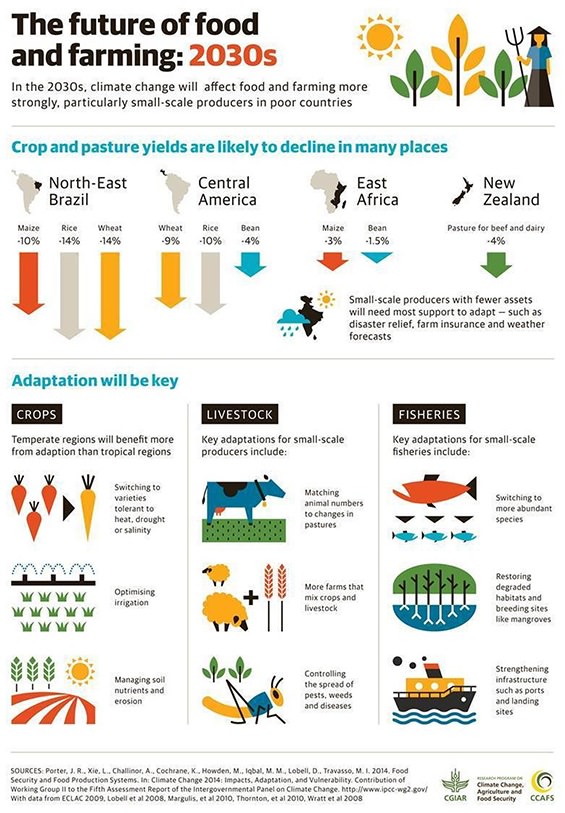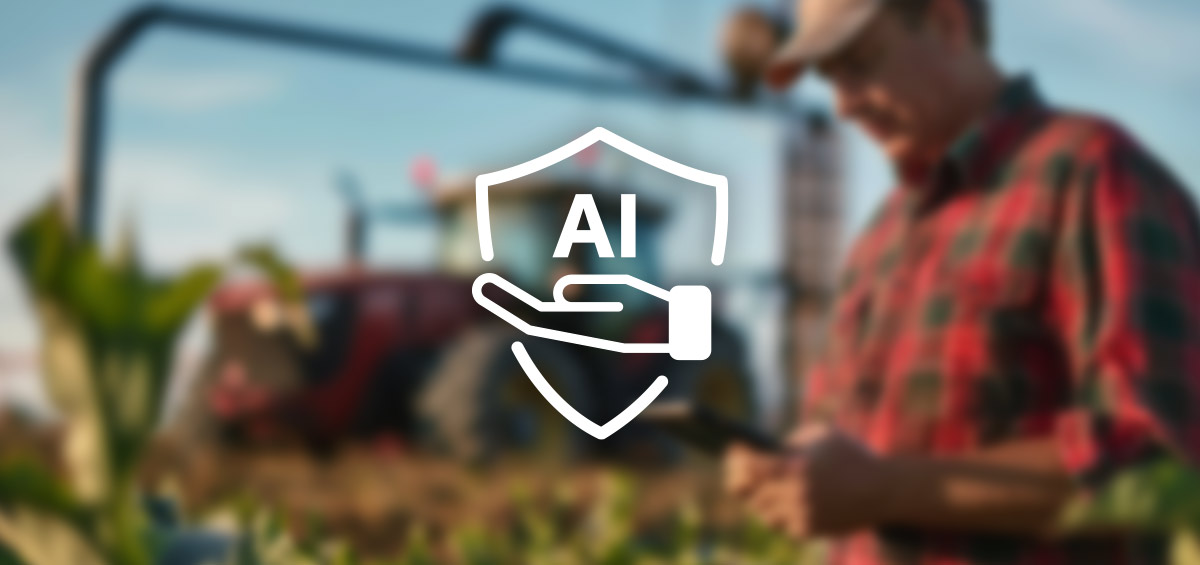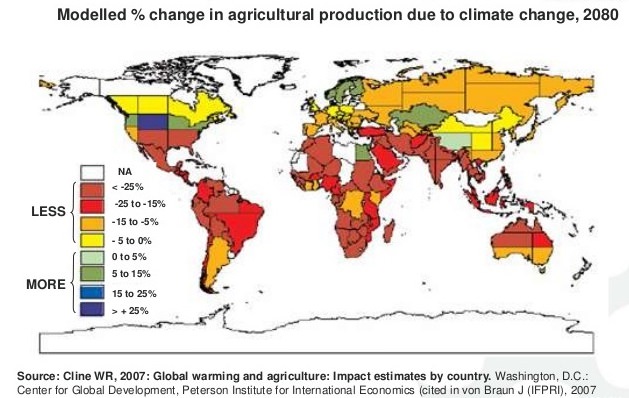
Climate change will impair farm production in many poor countries and regions
The accelerating pace of climate change, combined with global population and income growth, threatens food security everywhere. Agriculture is extremely vulnerable to climate change. Higher temperatures eventually reduce yields of desirable crops while encouraging weed and pest proliferation. Pests management become less effective, meaning that higher rates of pesticides will be necessary to achieve the same levels of control. Heat waves can cause extreme heat stress in crops, which can limit yields if they occur during certain times of the plants’ life-cycle (pollination, pod or fruit set). Also, heat waves can result in wilted plants (due to elevated transpiration rates) which can cause yield loss if not counteracted by irrigation. Heavy rains that often result in flooding can also be detrimental to crops and to soil structure. Most plants cannot survive in prolonged waterlogged conditions because the roots need to breathe. The overall impacts of climate change on farming are expected to be negative, threatening global food security.
Consequences of 1°C rise in worlds temperature
A number of countries in Africa already face semi-arid conditions that make agriculture challenging, and climate change will be likely to reduce the length of growing season as well as force large regions of marginal agriculture out of production. Projected reductions in yield in some countries could be as much as 50% by 2020, and crop net revenues could fall by as much as 90% by 2100, with small-scale farmers being the most affected.
Farming in a warmer world
Changes in climate may also impact the water availability and water needs for farming. If temperature increases and more sporadic rainfall events result from global warming, it is possible that irrigation needs could increase in the future. In anticipation of these changes, plant breeders are currently working to develop new varieties of crops that are considered to be drought tolerant, and more adaptable to varying levels of temperature and moisture.
Effects of global warning on agriculture
Agriculture contributes to climate change by anthropogenic emissions of greenhouse gases (GHGs), and by the conversion of non-farm land (e.g., forests) into farm land. Agriculture, forestry and land-use change contributed around 20 to 25% to global annual emissions in 2010.
Food production in vulnerable areas can remain viable, but investments in the appropriate agriculture innovations are needed now, because some of the most effective ways to deal with climate change, like more resilient crop varieties and livestock breeds, can take up to 20 years to develop. Our efforts to mitigate the effects of climate change, urgent as they are, will have little effect over the next 50 years. Changes during this period have already been set in motion by past greenhouse gas emissions.
Limiting greenhouse gas emissions will only affect climate change in the long-term (beyond 50 years). So we must learn to adapt to the changes in climate that will occur over the next 50 years.
The future of food and farming infographic- 2030s
Sustainable Agriculture as the Foundation of the Global Food Industry for the Future
The global landscape is changing, and so are the demands placed on agriculture. As the world’s population continues to grow, the pressure on our agricultural systems to produce more food, while simultaneously reducing their environmental footprint, has never been greater.
Today, over one-quarter of global greenhouse gas (GHG) emissions originate from agriculture, forestry, and land-use change. It is very clear to all of us that sustainable agriculture is no longer a buzzword but a necessity!
Technology is thus emerging as a key ally in this path. Although the last decade was the renaissance of innovation and technologies in agriculture, only 2% of all 500 million farms globally embraced technology in their everyday work. The majority of the 98 % of farms are still not digitalized.
Farmers are central to the sustainability transition, but financial and other burdens stand in the way of wide-scale adoption of technology solutions. Farm management software systems (FMS) such as AGRIVI Farm Enterprise or AGRIVI Agriculture Supply Chain are particularly promising because they can equip farmers with data and information needed to evaluate and manage how they utilize large value pools, including inputs such as fertilizers, seeds, and pesticides, machinery, labor or finance. It also allows farmers to efficiently manage their operations while simultaneously focusing on sustainability.
Farm Management Solution for Sustainability & Profitability
FMS is the key step of digital agriculture implementation in a farm because it serves as the foundation for all other digital agriculture solutions. It provides a centralized platform for data collection, analysis, and management, allowing farmers to make informed decisions based on real-time insights into farm operations. Without it, managing multiple other digital agriculture solutions can be challenging and may not deliver the expected outcomes.
Moreover, the impact of FMS on sustainability is not just theoretical—it’s tangible. Farms that have adopted these tools report significant reductions in resource consumption and environmental impact.
Through real-time data and analytics, FMS assists farmers in optimizing resource use, minimizing the environmental footprint, and calculating precise quantities of inputs like fertilizers and water. This reduces resource consumption, benefiting both the environment and the farm’s bottom line.
Moreover, FMS offers data-driven decision-making capabilities, enabling informed choices on planting, irrigation, and pest control. By optimizing operations, FMS reduces the reliance on heavy machinery, curbing fuel consumption and greenhouse gas emissions. It also monitors environmental factors like soil health, weather, and crop performance, allowing farmers to adapt practices in real-time, leading to enhanced yields and crop resilience. With its data-driven guidance, it also supports farmers to perform sustainable practices such as crop rotation and reduced tillage, enhancing soil health and water retention, ultimately reducing environmental harm.

Examples of Actual Farm Improvements Made by Using AGRIVI Farm Management Software in Regular Farm Operations
Without productive and profitable crop production, sustainable agriculture would be just a fiction not a reality. Without making their farm business profitable, there won’t be any farmers who will grow the food we eat. Thus, encouraging sustainability in agriculture practices must be followed by enabling farmers to overcome financial challenges and secure profit and livelihood. There is proof that implementing farm management software enables total cost saving from 10 to even 20 percent.
Sustainable agriculture is not a choice but an imperative. As the world struggles with issues related to food security and environmental concerns, leveraging technology like farm management software provides optimism. It empowers farmers to make data-driven decisions that benefit both their bottom line and the planet.
